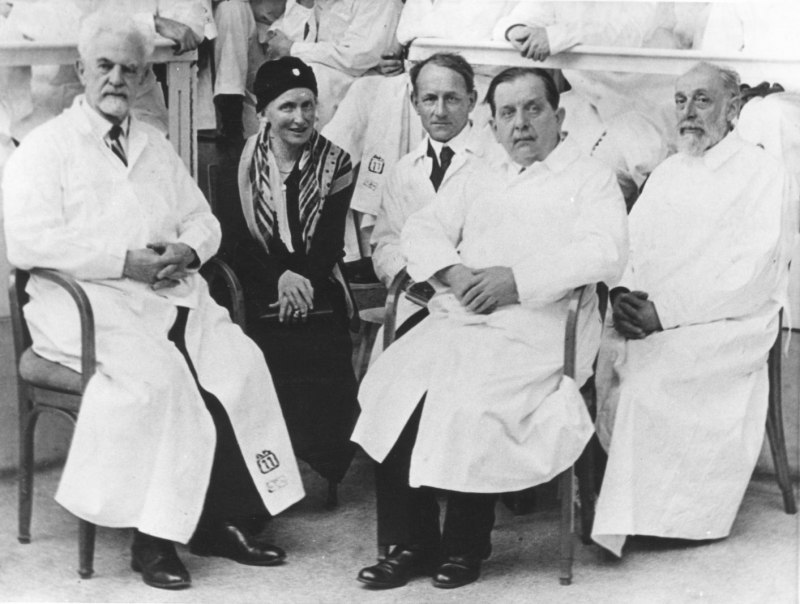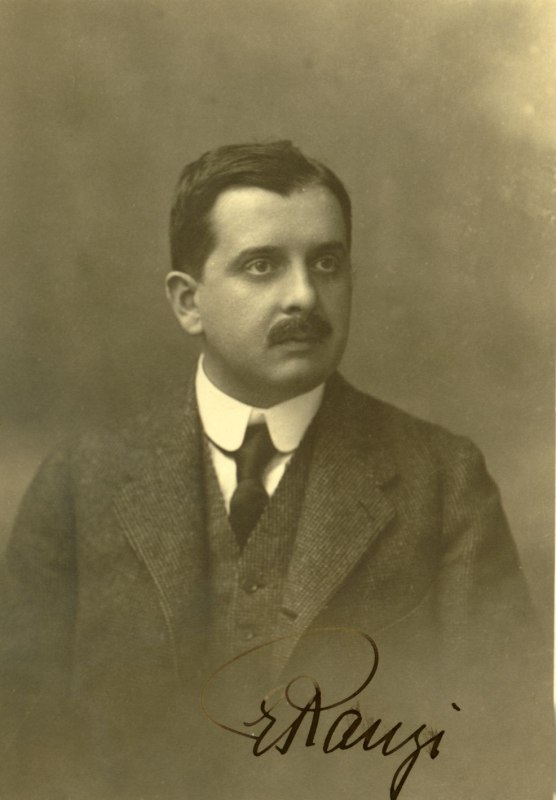Egon Ranzi, Prof. Dr.
Functions
| Dean | Faculty of Medicine | 1937/38 |
| Senator | Faculty of Medicine | 1936/37 |
- Medicine
- Surgery
- Faculty of Medicine
Ranzi, the son of a royal and court lawyer, attended the Schottengymnasium secondary school in Vienna and then studied medicine at the University of Vienna from 1893 until 1899. Already in 1896 he had begun working under Carl Toldt as a demonstrator at the anatomic chair. After he obtained his doctorate, from 1899 until 1900, he was deputy assistant doctor at the garrison hospital I and in 1900/01 again a demonstrator at the pathological-anatomical institute under Anton Weichselbaum. He joined the 1st surgical clinic under Anton von Eiselsberg as a trainee surgeon and worked there from 1902 until 1919 as an assistant. Meanwhile he was able to habilitate for surgery at the University of Vienna and became associate professor in 1912. According to Ranzi’s file card in the Reich Doctors’ Registry he took part in the First World War from 1914 until 1918, although no relevant information in this regard can be found in the biographical encyclopedias.
From 1919 until 1924 Ranzi was chief physician and chairman of the 1st surgical department of the Rudolfsstiftung hospital in Vienna and became a full professor for surgery at the University of Innsbruck in 1924 as well as chairman of the surgical clinic. During this time he also was a member of the “Association of German Doctors in Austria” that enforced the “Aryan Paragraph”. In the academic year of 1929/30 he was Dean in Innsbruck and in 1932 returned to the 1st surgical clinic at the University of Vienna as Eiselberg’s successor in the position of full professor and chairman of the clinic. Ranzi, who since 1929 suffered from an atrophic kidney, made a name for himself in the following years by expanding the emergency room and founding a urological department, as well as preparing the foundation of a radiology department.
In the authoritarian corporative state Ranzi held a number of important positions: From November 1st, 1934, until March 12th, 1938, he was a member of the federal economic council as well as of the socio-political commission (as the representative of the employees in the group F – free professions). He had a leading function in the Vaterländische Front (Fatherland’s Front) and was chairman of the Reich Association of Austrian Doctors’ Organizations and 2nd vice president of the Chief Medical Council. In the academic year 1936/37 he acted as senator and in 1937/38 as Dean of the medical faculty. According to Enderle-Burcel many National Socialist students were expelled during this time.
This close relationship with Austrofascism also led to severe measures after Austria’s “Anschluss” to the German Reich. A short while later he was arrested and interned at the police prison Elisabethpromenade. According to Burcel the new authorities considered him a “legitimist and ‘liberal’ Catholic”. He was released after six weeks, when at the end of April the medical Dean’s Office and the rectorate of the University of Vienna had intervened on his behalf. Burcel writes that this was due to Ranzi being severely ill.
Meanwhile, he was “put on leave until further notice” as of April 22nd, 1938, at the University of Vienna and sent into temporary retirement at the end of May 1938. If one looks at comparable cases of other officials of the corporative state – such as Leopold Arzt – one can expect that a trial on the basis of the Career Civil Servant Act also was underway. This would have resulted in especially strict punishments, for example a decrease of the pension or dismissal. Presumably all this did not come to pass due to Ranzi’s early death in June 1939. The Nazi authorities had incidentally forbidden anyone to commemorate his death in the medical lectures.
Ranzi mainly studied malign tumors, immunity research, neurosurgery, surgery of the spleen and the thorax as well as the surgical treatment of lung tuberculosis. He became well known for the design and expansion of the surgical departments in Vienna and Innsbruck.
He was a member and temporarily first secretary of the Society for Surgery, the Society of German Natural Scientists and Doctors, the Association for Psychiatry and Neurology in Vienna, the Society of German Neurologists, the Medical Doctors’ Council in Vienna, a corresponding member of the Académie de Chirurgie in Paris, chairman of the Association for the Promotion of Continued Medical Education as well as secretary of the Austrian Society for the Study and Treatment of Cancer.
Archiv der Universität Wien, Medizinische Fakultät, Personalakt 473 (Sauser); Rektoratsakten GZ 677-1937/38. |
Bundesarchiv Berlin, Reichsärzteregister. |
Österreichisches Staatsarchiv/Allgemeines Verwaltungsarchiv, Bestand Unterricht, Personalakt.
Zuletzt aktualisiert am 04/15/22
-

Professoren der Medizinischen Fakultät, 1935
Professoren der Medizinischen Fakultät, 1935: Anton von Eiselsberg (1. von links), Hans Pichler (3. von rechts), Otto Marburg (1. von rechts), Egon...

